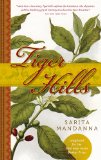Summary | Excerpt | Reviews | Beyond the Book | Read-Alikes | Genres & Themes | Author Bio

A Novel
by Sarita MandannaThis article relates to Tiger Hills
"Dizzying" and "glorious" are the words Sarita Mandanna first uses to describe the Indian district that is her birthplace and the setting for Tiger Hills. Now known primarily as Kodagu rather than the anglicized name, "Coorg," used in the novel, the district has long been known, as Mandanna notes, as "The Scotland of India" by the many white inhabitants who have come to the area since the early nineteenth century, in large part to profit from its wealth of natural resources.
 The Kodagu District's official website dubs the region "The Land of Coffee, Pepper, Honey, Cardamom, and Oranges." Teak, tea, and rubber have also been cultivated in the area. Tucked between the mountains and the sea, composed of sunny hills and imposing forests, Kodagu is, as Mandanna vividly describes, a land of geographical contrasts and complexities. Even today, its unusual topography has kept the region relatively isolated; six hours by road from Bangalore (the nearest major city), the district has no train or airline service.
The Kodagu District's official website dubs the region "The Land of Coffee, Pepper, Honey, Cardamom, and Oranges." Teak, tea, and rubber have also been cultivated in the area. Tucked between the mountains and the sea, composed of sunny hills and imposing forests, Kodagu is, as Mandanna vividly describes, a land of geographical contrasts and complexities. Even today, its unusual topography has kept the region relatively isolated; six hours by road from Bangalore (the nearest major city), the district has no train or airline service.
 Just as Mandanna vividly describes in Tiger Hills, Kodagu celebrates a number of unique festivals, including Kaveri Sankramana, the celebration of the goddess Kaveri at the sacred source of the river that bears her name; and Kailpodhu, a festival of arms that celebrates military service, especially significant among the Kodavas, a martial race who are ethnically and culturally distinct from the other people of South India.
Just as Mandanna vividly describes in Tiger Hills, Kodagu celebrates a number of unique festivals, including Kaveri Sankramana, the celebration of the goddess Kaveri at the sacred source of the river that bears her name; and Kailpodhu, a festival of arms that celebrates military service, especially significant among the Kodavas, a martial race who are ethnically and culturally distinct from the other people of South India.
Tiger Hills is filled with colorful descriptions of the flora that carpet the hills of Kodagu and the animals that make their homes there. Indeed, the district is home to a national park and several wildlife sanctuaries, where elephants, monkeys, cobras, wild boar, and, yes, tigers, make their homes.
Images: View of Kodagu, location unknown; map showing location of Kodagu within India (click for larger image); source: Wikimedia Commons
Filed under Places, Cultures & Identities
![]() This article relates to Tiger Hills.
It first ran in the April 6, 2011
issue of BookBrowse Recommends.
This article relates to Tiger Hills.
It first ran in the April 6, 2011
issue of BookBrowse Recommends.
When an old man dies, a library burns to the ground.
Click Here to find out who said this, as well as discovering other famous literary quotes!
Your guide toexceptional books
BookBrowse seeks out and recommends the best in contemporary fiction and nonfiction—books that not only engage and entertain but also deepen our understanding of ourselves and the world around us.